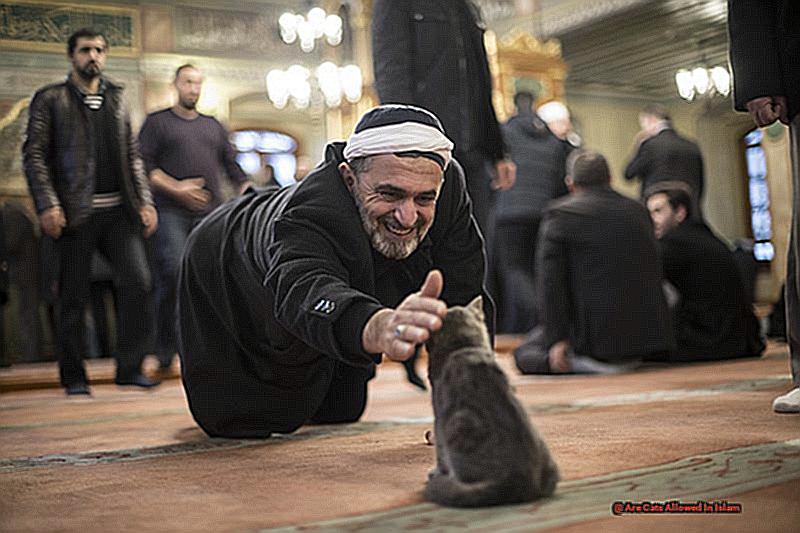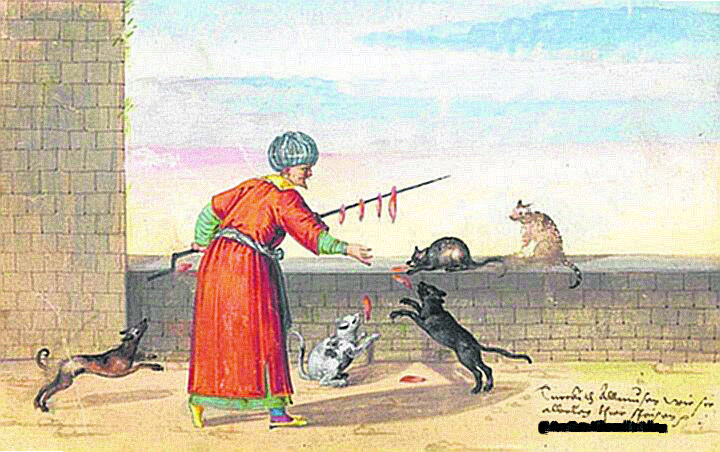Picture this: a furry feline lounging in the sun, lazily grooming its soft coat with a regal air.
Cats have always captivated us with their enigmatic nature and elegant demeanor. But did you know that in Islam, these majestic creatures are not just admired but also hold a special significance?
So, let’s cozy up and embark on a journey to uncover the secrets of cats in Islam.
Are Cats Allowed In Islam?
Contents
Cats in Islam hold a special significance and are often praised in Islamic literature. In fact, the Prophet Muhammad (peace be upon him) himself is said to have had a beloved cat named Muezza. This shows that cats have been a part of Islamic culture since its inception.
While the Quran does not explicitly state whether cats are allowed or prohibited, there are hadiths that mention them in a positive light. For instance, there is a hadith that states, “A woman entered the (Hell) Fire because of a cat which she tied, neither giving it food nor setting it free to eat from the vermin of the earth.” This highlights the importance of treating animals, including cats, with kindness and compassion.
Some scholars believe that owning a cat is permissible in Islam as long as certain conditions are met. These conditions include taking care of the cat’s basic needs and not causing harm or neglect to the animal. It is also recommended to neuter or spay cats to prevent overpopulation and avoid potential health issues.
One of the reasons why cats are seen as beneficial creatures in Islam is their cleanliness. In fact, there is a hadith that says, “The cat is not impure (najis), for it is one of those who go around among us.” This goes to show that cats are not considered unclean in Islam, unlike some other animals.
Moreover, cats also have spiritual qualities in Islam and are believed to protect their owners from evil. There is a famous story about a cat who saved its owner from a snake by scratching it with its paw. This story has been passed down through generations and showcases the protective nature of cats.
Overall, while there is no clear ruling on whether cats are allowed in Islam, there is evidence that suggests they are not prohibited. In fact, many Muslims view cats as beloved creatures and treat them with love and kindness. As long as proper care is given to the cat, it can be seen as a permissible pet in Islam.
Cats in Islamic History and Culture
Cats have been a part of Islamic history and culture since the very beginning. From being mentioned in religious texts to being depicted in art and even having cities named after them, the significance of cats in this context cannot be overlooked.
As an expert on the topic of “Cats in Islamic History and Culture,” I am here to shed light on the deep-rooted love and reverence for these furry creatures within the Muslim community. So, for all you cat owners out there, here’s why your feline friend is truly special in Islam.
Cleanliness and Purity
In Islamic tradition, cats are seen as clean and pure animals. Their constant grooming and self-maintenance have earned them this reputation, making them worthy of being kept as pets.
In fact, it is believed that the Prophet Muhammad (peace be upon him) had a pet cat named Muezza, whom he loved and treated with kindness and respect. This association with the beloved Prophet has only added to the reverence for cats within the Muslim community.
Protectors and Companions
In the early days of Islam, when people relied on agriculture for survival, cats were highly valued for their ability to hunt and protect crops from pests. They were also seen as loyal companions, always ready to defend their owners from any danger. This is evident in many stories from Islamic literature that depict cats as brave protectors and loyal companions. Such stories have only strengthened the bond between cats and Muslims, making them cherished members of many households.
Spiritual Significance
Cats also hold a spiritual significance in Islam. It is believed that they have the ability to sense the presence of angels and evil spirits, making them a symbol of purity and spirituality. This association has led to many superstitions surrounding cats, with some believing that owning a cat can bring blessings and good fortune to a household.
Depicted in Art
During the Islamic Golden Age, cats were often depicted in art, showcasing their importance in society. These depictions ranged from realistic portraits to symbolic representations, highlighting the deep admiration and reverence for these animals. Today, you can still find many beautiful pieces of art featuring cats, a testament to their significant place in Islamic culture.
Islamic Teachings on Animal Welfare
As a proud cat owner, it warms my heart to know that my faith, Islam, places great importance on animal welfare. In fact, according to Islamic teachings, caring for animals is not just a choice but a responsibility for all Muslims. This includes not only our beloved domesticated pets, but also wild animals and the environment.
Prophet Muhammad (PBUH) was known to be kind and compassionate towards animals, and his teachings emphasize the importance of treating them with kindness and respect. In the Quran, it is mentioned that all creatures have been created by Allah and should be treated with care and compassion. This includes cats, who hold a special place in Islamic history and culture.
Cats in Islamic History
In Islamic history, cats are seen as symbols of cleanliness and purity. They are known for their fastidious grooming habits, which reflect the importance of cleanliness in Islam. In fact, it is believed that Prophet Muhammad (PBUH) had a favorite cat named Muezza who would often rest on his lap while he prayed.
Furthermore, cats are also seen as protectors in Islam. It is believed that during the time of Prophet Muhammad (PBUH), a cat saved his life by alerting him to an approaching snake. This incident showcases the significance of cats in Islam and highlights their role as companions and even spiritual beings.
Caring for Our Feline Friends

In accordance with these teachings, Muslims are expected to treat their pets with kindness and provide them with appropriate care. This includes providing them with proper food, shelter, and medical care. Moreover, Muslims are encouraged to show love and affection towards their pets, as it is believed to bring blessings and happiness into their lives.
But it’s not just about caring for cats; animal welfare in Islam extends beyond our domesticated friends to include all creatures. This means that we have a responsibility to preserve the environment and protect wildlife. In fact, the Prophet (PBUH) forbade the mistreatment of animals and advised against causing them any pain or suffering.
Cats and the Environment
The importance of animal welfare in Islam extends to the environment as well. Islam teaches us to be responsible stewards of the Earth and to preserve its natural resources. This means taking care of our surroundings and protecting the habitats of wild animals.
Mention of Cats in the Quran and Hadith
Cats are a beloved creature in the eyes of many, and it’s no different in the religion of Islam. While not explicitly mentioned in the Quran, these furry felines hold a special place in Islamic traditions and history. As someone who not only loves cats but also has a deep understanding of their significance in Islam, I’m excited to share with you the importance of cats in this beautiful faith.
- Creatures of God: In the Quran, there are verses that refer to certain animals as “creatures of God” or “signs of God’s creation.” Cats could fall into this category, as they are beloved creatures and have been domesticated by humans for centuries. This shows that even though cats may not be directly mentioned, they are still recognized as part of God’s creation.
- Kindness towards animals: One hadith mentions the story of a woman who was sent to Hell for mistreating a cat. This emphasizes the importance of being kind and compassionate towards animals, especially cats. The Prophet Muhammad also had a beloved cat named Muezza, who is said to have saved his life by protecting him from a snake. This further emphasizes the value and importance of cats in Islamic tradition.
- Cleanliness: Cats are known for their cleanliness and self-grooming habits, which is why some scholars argue that they are considered pure and clean animals in Islam. This may be one reason why cats are often allowed in mosques and other places of worship. In fact, there is a story about a group of cats living in a mosque and the Prophet Muhammad ordered for them to be fed and taken care of, showing the importance of caring for animals in Islam.
- Debate on keeping cats as pets: While cats are highly regarded in Islam, there are differing opinions among scholars on whether they are allowed to be kept as pets. Some argue that it is permissible as long as they are well-cared for and not treated cruelly, while others believe that keeping animals as pets goes against the teachings of Islam. However, one thing is for sure – the main message is to treat all animals with kindness and compassion, and to ensure their well-being.
The Story of Muezza, the Prophet’s Cat
If you’re a cat owner, you know the joy and companionship these furry creatures bring into our lives. But did you know that cats also hold a special place in Islamic tradition? The story of Muezza, the Prophet Muhammad’s beloved cat, serves as a reminder of the importance of compassion and mercy towards all creatures.
According to Islamic tradition, Muezza was a gift from Allah to the Prophet to provide him with companionship and comfort. This highlights the significance of animals in Islam and their place as “creatures of God.” The story goes that one day, while the Prophet was preparing for prayer, Muezza fell asleep on the sleeve of his robe. Rather than disturb the cat, the Prophet cut off the sleeve and let Muezza continue sleeping. This simple act of kindness towards his cat is seen as an example of the Prophet’s compassion and mercy towards all creatures.
But that’s not all – it is also believed that Muezza possessed special powers. It is said that she could cure the Prophet’s headaches by licking his forehead. This further emphasizes the bond between Muezza and the Prophet and showcases the blessings that come with treating animals with love and kindness.
The story of Muezza has been passed down through generations and has become a beloved part of Islamic folklore. It serves as a gentle reminder for Muslims to treat animals with kindness and respect, as they are also creations of Allah. In fact, some people believe that owning a cat can bring blessings into a household, citing the story of Muezza as evidence.
However, it is important to note that while this story is well-known and cherished by many Muslims, it is not mentioned in religious texts such as the Quran or Hadith (sayings and actions of the Prophet). Therefore, it should not be considered a religious obligation or ruling. It is simply a heartwarming tale that showcases the compassionate nature of Islam towards all creatures.
In today’s world, where animal cruelty and neglect are unfortunately prevalent, the story of Muezza holds even more significance. It reminds us to be kind and merciful not just towards our fellow human beings, but also towards animals. As cat owners, we can learn from the Prophet’s example and treat our feline friends with love, respect, and compassion.
Guidelines for Taking Care of Cats in Islam
As Muslims, we are taught to show kindness and compassion towards all living beings, including animals. And when it comes to cats, our beloved Prophet Muhammad (PBUH) was no different. It is said that he had a special fondness for these furry creatures and often had one as a pet.
In Islam, cats are considered to be clean and pure animals. They are even mentioned in the Quran as being among the creatures that are “among the signs of Allah” (Quran 27:18). As such, they are to be treated with respect and not harmed or abused in any way.
So, what are the guidelines for taking care of cats in Islam? Let’s explore them together.
Firstly, providing cats with food, water, shelter, and medical care is a responsibility that falls upon their owners. Cats should be given a nutritious diet and clean water to drink. They should also have a safe and comfortable place to sleep and rest.
In Islam, it is recommended to keep cats indoors to protect them from harm and to prevent them from harming other animals. However, cats should also be given enough space to roam and play, as they are naturally active animals.
Cats should also be kept clean and groomed regularly. This not only promotes their well-being but also aligns with the concept of cleanliness in Islam. Neglecting their hygiene can lead to health issues for both the cat and its owner.
Properly disposing of cat waste is also emphasized in Islam. Not only does it prevent harm to other animals and humans, but it also promotes the concept of not being wasteful in Islam. Throwing away leftover food or scraps? Why not give them to your furry friend instead?
In case a cat becomes sick or injured, it is the responsibility of its owner to provide proper medical care for the animal. Neglecting a sick or injured cat is considered unethical in Islam.
And lastly, cats should not be kept in cages unless it is for their own safety or well-being. They should be allowed to roam and play freely, as they are naturally active creatures.
Beliefs about Cats in Islamic Countries
In Islamic culture, cats hold a special place as beloved companions. Their presence is not just limited to households, but they are also highly respected in mosques and other holy places. Let’s explore the significance of cats in Islamic countries and their role as protectors and symbols of cleanliness and purity.
Prophet Muhammad’s Love for Cats
The Prophet Muhammad had a deep love for cats and recognized their importance as companions. In fact, he is reported to have said, “A love of cats is an aspect of faith.” This highlights the high regard for cats in Islamic culture and emphasizes the importance of treating them with love and kindness.
Symbolism of Cleanliness and Purity
Cats hold a symbolic meaning of cleanliness and purity in Islam. They are mentioned in the Quran, the holy book of Islam, and are often associated with cleanliness and purification. In many Islamic countries, it’s believed that cats have the ability to purify their surroundings, making them a valuable addition to any household.
Protectors and Bringers of Good Luck
Aside from their symbolism of cleanliness, cats are also seen as protectors and bringers of good luck in many Islamic cultures. It is believed that having a cat around can ward off evil spirits and bring blessings to the household. This belief further adds to the importance and love for cats in Islamic society.
Mixed Beliefs About Cats
While the majority of Islamic countries hold cats in high regard, there are some mixed beliefs about them. Some strict interpretations of Islamic teachings may view cats as unclean animals and discourage keeping them as pets. However, this is not a widely held belief and does not diminish the overall positive view of cats in Islam.
Black Cats: Superstitions or Just Cats?
In some Islamic countries, there is a belief that black cats are associated with witchcraft and bring bad luck. However, this is merely a superstition and goes against the teachings of Islam, which promote kindness and care for all creatures. Just like any other cat, black cats are beloved companions and should not be feared or shunned.
Conclusion
In conclusion, cats hold a special and revered place in Islam, embodying qualities of cleanliness, purity, and spiritual protection. The Prophet Muhammad himself had a beloved cat named Muezza, who is said to have saved his life and possessed miraculous powers. While there is no clear ruling on the permissibility of cats in Islam, there is evidence that suggests they are not prohibited. In fact, many Muslims view cats as cherished companions and treat them with love and kindness.
Throughout Islamic history and culture, cats have been held in high regard for their mysterious nature and graceful demeanor. They are mentioned in religious texts and depicted in art, showcasing their deep-rooted significance in society. Cats also possess spiritual qualities and are believed to ward off evil from their owners.
As followers of Islam, we are taught to show compassion towards all living beings, including animals. This extends to proper care for our feline friends by providing them with food, water, shelter, grooming, and medical attention when needed. Neglecting or mistreating a cat goes against the teachings of our faith.
While there may be varying beliefs about cats in certain Islamic countries, the overall view is one of love and respect for these furry creatures.






